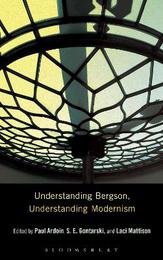
|
Understanding Bergson, Understanding Modernism
Hardback
Main Details
Description
Henri Bergson is frequently cited amongst the holy trinity of major influences on Modernism-literary and otherwise-alongside Sigmund Freud and William James. Gilles Deleuze's Bergsonism has re-popularized Bergson for the 21st century, so much so that, perhaps, our Bergson is Deleuze's Bergson. Despite renewed interest in Bergson, his influence remains understudied and consequently undervalued. While books examining the impact of Freud and James on Modernism abound, Bergson's impact, though widely acknowledged, has been closely examined much more rarely. Understanding Bergson, Understanding Modernism remedies this deficiency in three ways. First, it offers close readings and critiques of six pivotal texts. Second, it reassesses Bergson's impact on Modernism while also tracing his continuing importance to literature, media, and philosophy throughout the twentieth and into the 21st century. In its final section it provides an extended glossary of Bergsonian terms, complete with extensive examples and citations of their use across his texts. The glossary also maps the influence of Bergson's work by including entries on related writers, all of whom Bergson either corresponded with or critiqued.
Author Biography
Paul Ardoin is Assistant Professor of English at the University of Texas at San Antonio, USA. S. E. Gontarski is the Robert O. Lawton Distinguished Professor of English at Florida State University, USA. He is the author or editor of 15 books, including Samuel Beckett: The Complete Short Prose, 1928-1989 and The Grove Press Reader, 1951-2001. Laci Mattison is Visiting Lecturer of English Literature at Florida State University, USA.
ReviewsThe tripartite structure adopted for the collection works extremely well, neatly separating discussions of key texts and terms from their analysis against, across and beyond the Modernist period. [...] 'Diving in at will': might Ardoin's description of the recklessly perceptive modernist artist serve just as well as a suggestion for how we ought to encounter Bergsonian thought in Understanding Bergson, Understanding Modernism? Perhaps. 'The best way ... to understand a concept like duree or elan vital, for instance, is to dive into its cross-textual development,' Ardoin, Gontarski and Mattison insist at the outset. Such an approach proves fruitful, elucidating and building upon ideas of free will, artistic perception, comedy and memory. [...] 'Diving in at will' may well be its recommended approach, but the volume still rewards those readers wishing only to wet their toes. -- James Bailey, University of Sheffield, UK * European Journal of English Studies, 18:2, 2014 * [In this book] contributors gauge how Bergson's philosophical notions and tropes were woven into the fabric of canonical modernist texts; the glossary is especially helpful in its elucidation of Bergsonian terms. * The Year's Work in English Studies * Here, finally, is a cogent introduction to the work of Henri Bergson. In a series of lucid and engaging chapters, the contributors to Understanding Bergson, Understanding Modernism analyse Bergson's vital influence on the intellectual and artistic legacy of modernism. This timely volume will be a key resource for anyone interested in the literary culture of the modernist period. * Ulrika Maude, Lecturer in English, University of Bristol, UK * Bergson was one of the great philosophical modernists of the twentieth century and this volume provides a welcome revaluation of modernism and its legacy through his key ideas and writings. It ably demonstrates that to engage with modernism through Bergson is also relevant to our own time, as we negotiate the complexities of a post-industrial, post-modern world. * Keith Ansell-Pearson, Professor of Philosophy, University of Warwick, UK * Despite the sustained and rigorous efforts to explain and reclaim the importance of Bergson, he, somewhat surprisingly, still remains a largely marginal figure in discussions of literary modernism. This book is a welcome new intervention that sets out both to underline the depth of influence Bergson has had on our intellectual culture, and to offer tools with which, again, to think with Bergson, and through Bergson back into modernist literature. * Anthony Uhlmann, Professor of English, University of Western Sydney, Australia * A wide ranging affirmation of the centrality of Henri Bergson's work in understanding some of the key literary writings of modernism that explore in the most concrete ways the reality of duration. Bergson's role in the creation of a new kind of philosophy of the real, a new metaphysics, is now clear. This book will ensure that his role in the creation of a new kind of literature is made convincingly and satisfyingly explicit. * Elizabeth Grosz, Jean Fox O'Barr Women's Studies Professor in Trinity College of Arts and Sciences, Duke University, USA *
|